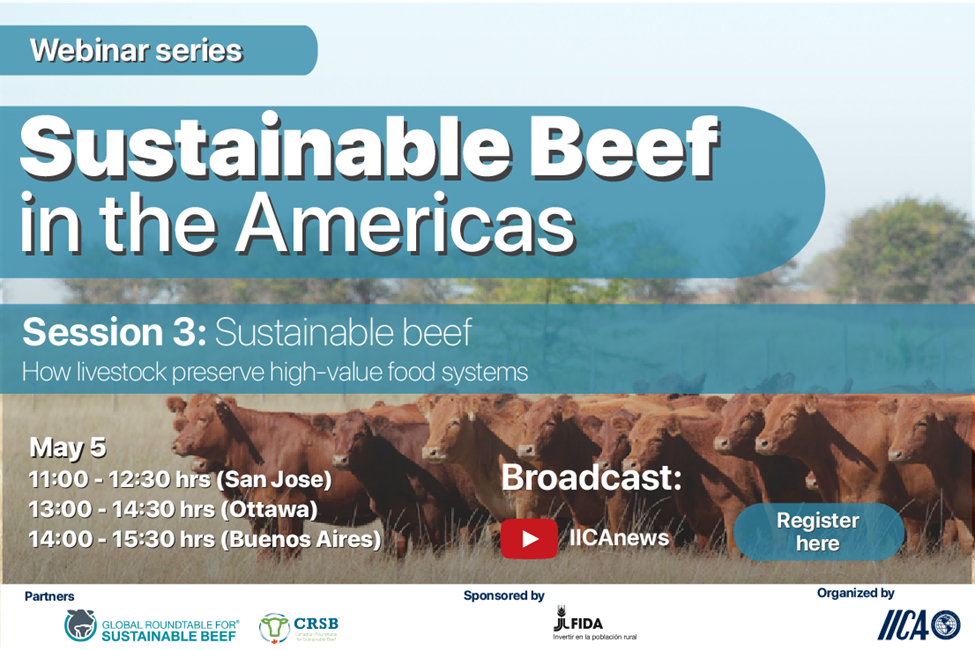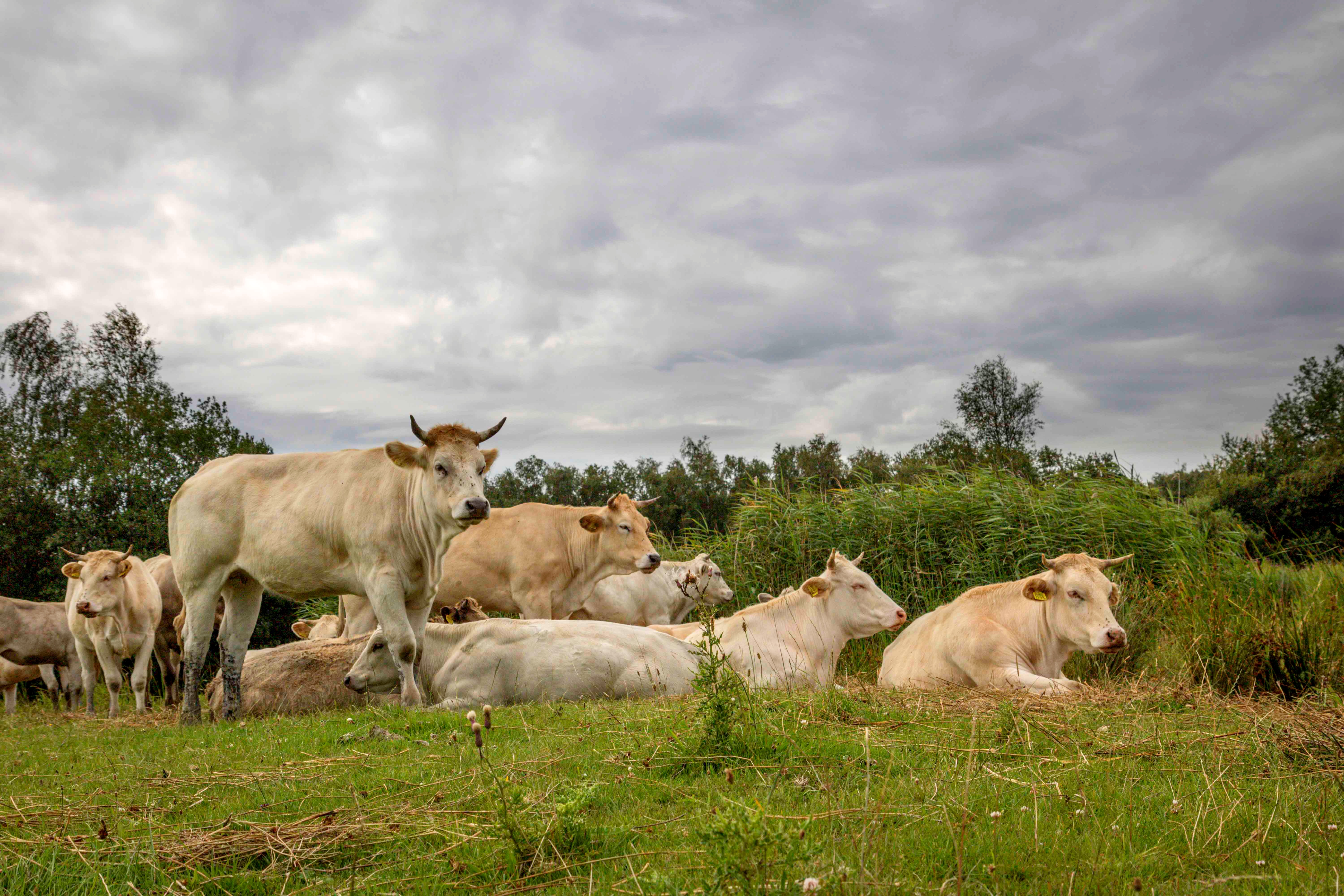Learnings from IICA’s webinar series on Sustainable Beef in the Americas

From March 31st to June 1st, IICA Canada brought together experts from across the world to share strategies and tools to integrate sustainability into beef production in the bi-weekly webinar series “Sustainable Beef in the Americas”. During its run, the series amassed over 300 attendees from all around the world, interested in learning how cattle can help mitigate climate change and preserve high-value food systems.
Experts agreed that climate change poses a significant threat to food production and its impacts are projected to aggravate in the future. Livestock production is simultaneously a large contributor to climate change and a major recipient of its consequences, as it is already affecting animal health, welfare, and productivity, with disproportionate impacts on poor and disadvantaged rural communities.
|
“Cattle raising can be an ally in fighting climate change and desertification, as well as in the preservation of biodiversity, if sustainable practices are implemented.” |
Yet, according to the speakers’ research and experiences, cattle raising can be an ally in fighting climate change and desertification, as well as in the preservation of biodiversity, if sustainable practices are implemented. Across the 5 webinars of this series, the role of grazing ruminants in conservation, nutrient cycling, and soil and ecosystems’ health was recurrently highlighted.
Regenerative Agriculture practices
Speakers from Brazil, Mexico, Colombia and Argentina shared their research and experience with integrated crop-livestock-forestry systems and their positive social and environmental effects. Boosting profits by improving yields and lowering or eliminating the need for synthetic inputs, improving animal welfare, sequestering carbon, and improving functional soil health, water infiltration rates, and water usage efficiency in the soil were some of the advantages mentioned. It was also highlighted that livestock can play an important role within the circular bioeconomy, such as using manure as a natural fertilizer and for bioenergy production through bio-digestion. Mr. Adrian Vega, Deputy Director at the General Livestock Division of the Secretariat of Agriculture and Rural Development of Mexico, Ms Fabiana Villa Alves, Director of the Department of Sustainable Production and Irrigation in Brazil, and Dr. Clarita Bustamante, from the Knowledge Management Commission of the Sustainable Livestock Roundtable of Colombia, indicated that their countries have integrated these farming systems into their climate adaptation strategies.
Acknowledging grasslands’ role in conservation and carbon sequestration
Worldwide demand for agricultural goods is increasing and adding pressure on natural ecosystems to be converted to agriculture, with few policies and incentives understanding the importance of grassland ecosystems as a high-value food system. Mr. Pablo Preliasco, Specialist in Sustainable Livestock at the Wildlife Foundation of Argentina (FVSA) explained that habitat loss is the primary cause of biodiversity loss and declared that deforestation and replacement of grasslands with crops must come to an end. But he also pointed out that cattle ranching can be compatible with wildlife conservation when carried out in natural systems under sustainable and conservation-friendly practices. Experts agreed that Canada has extensive grassland ecosystems that maintain the cow-calf herd and those areas need to be preserved, and Ms. Kristine Tapley, Agricultural Sustainability Lead of Ducks Unlimited Canada, added that tools, programs, and policies supporting cattle farmers in the protection of grasslands are highly needed since economics will continue to drive agricultural conversion.

Misconceptions about cattle in global warming assessments
|
“Experts highlighted that cattle can play an important role in carbon sequestration for lowering net emissions.” |
A recurrent topic during the webinar series pertained to the misconceptions around the role of cattle and methane emissions in global warming. In both policy and media discourse, sustainability challenges of livestock production are frequently reduced to a single dimension, either GHG emissions or methane, and grossly neglect other important sustainability aspects such as biodiversity loss, land degradation, pollution, and impact on rural livelihoods. During the webinars, experts highlighted that cattle can play an important role in carbon sequestration for lowering net emissions, but that first we need to understand the carbon cycle. According to Dr. Tim McAllister, Research Scientist at Agriculture and Agri-Food Canada, we tend to calculate cattle emissions incorrectly, as if the animals were isolated from the system, only producing methane, when, in reality, cattle are part of a system that emits carbon but also has a large potential to sequester it through photosynthesis on surface biomass and below ground. He explained that using grazing management strategies, such as rotational grazing, as well as differences in stocking density, can help promote the development of below-ground root carbon within grassland ecosystems, which in turn can have implications for reductions in soil erosion and can also assist in the replenishment of groundwater. Throughout the webinar series, specialists agreed that with appropriate management strategies, grazing lands' carbon sequestration capability could be larger than their emissions.
Economic opportunities and financial market trends
Economic opportunities for the implementation of sustainable livestock management practices were an important aspect of the discussions in the webinar series. Mr. Justin Sherrard from Rabobank provided a glance at current financial market trends and stressed that financial markets are avoiding risks by rejecting enterprises that do not demonstrate their sustainability credentials. He pointed out the growing use of ESG (Environmental, Social, and Governance) metrics to screen investments, adding that companies are reporting more ESG metrics along their supply chains as well. He highlighted the importance of measuring and reporting, along with supply chain verification methods. This was reiterated by Mr. Pedro Amaral, Senior Sustainability Manager at Mars Global Petcare, who declared that his company has set a number of public-facing sustainability commitments, including decoupling raw materials bought from deforestation by 2025 and achieving net-zero carbon emissions by 2050. To achieve this, he indicated that MARS engages in copious traceability work, collaborating with suppliers and local and international organizations to deploy capacity-building activities and support their suppliers in adopting better practices.
Mr. Sherrard remarked that banks are now implementing sustainability-linked loans, which have specific sustainability criteria embedded into their legal documentation and provide an incentive, such as a differential interest rates, for meeting ESG criteria while also penalizing those who fail to meet the targets. He stressed that sustainability performance is beginning to impact cattle supply chains and if stakeholders are unable to demonstrate sustainability performance, they may be banned from some markets or penalized.
Multi-stakeholder platforms
Speakers throughout the series pressed on the importance of developing long-term strategies at various scales, including food systems, value chains, and public-private partnerships, as well as building broad and effective coalitions and assisting in the creation of enabling environments through markets, sustainable finance, and public policy. Miss Fawn Jackson, Director of Policy and International Affairs at the Canadian Cattlemen’s Association shared that, in Canada, successful partnerships between different stakeholder groups have grown since the inception of the Canadian Roundtable for Sustainable Beef and highlighted the role of such partnerships in disseminating best practices and technologies throughout their network. An example shared was the Beef carbon footprint standard recently published by the Global Roundtable for Sustainable Beef to encourage uniformity in emissions reporting globally.
Towards an integrated environmental footprint
|
“Rather than just focusing on carbon or methane, we need to consider an integrated environmental footprint that takes into account all of these characteristics when addressing the environmental impact and sustainability potential of the beef sector.” |
A key highlight of the webinar series was the need to move from a carbon footprint assessment towards an integrated environmental footprint that considers ecosystem services of livestock production in grasslands.
Specialists agreed that assessing the sustainability of anthropogenic activities only on the basis of their carbon footprint is a flawed approach since it ignores other key considerations. Cattle in natural grasslands emit more methane but, more crucially, help to maintain natural ecosystems, maintain biodiversity, improve water quality, and have a higher carbon sequestration capability. While on the other hand, natural resources and animal welfare are greatly endangered in industrial production systems. So, rather than just focusing on carbon or methane, we need to consider an integrated environmental footprint that takes into account all of these characteristics when addressing the environmental impact and sustainability potential of the beef sector.
To learn more, the full webinar series is available to watch in English, Spanish, and French on IICA’s website and on its Facebook and Youtube pages.
Acknowledgements: The webinar series on Sustainable Beef in the Americas was organized by the Inter-American Institute for Cooperation on Agriculture (IICA) and financed by the International Fund for Agriculture Development (IFAD) in collaboration with IICA, and both the Global and Canadian Roundtables for Sustainable Beef. This article was prepared for IICA and written by Vivian Arguelles González, with contributions and under the direction of Dr. Jean-Charles Le Vallée, Country Representative for IICA Canada. Special thanks go to Gloria Ramirez and Ysabel Giroux who coordinated all five webinars. The findings and conclusions of this piece are entirely those of IICA, not of the funder. Any errors and omissions in fact or interpretation remain the sole responsibility of the authors.
 Vivian Arguelles González is a veterinarian from Mexico and a Ph.D. Candidate at McGill University researching sustainability transitions in the livestock sector. She has experience working as an Animal Welfare Specialist, helping food companies and their suppliers in Latin America and Asia transition to better welfare systems for farm animals, and as an Animal Welfare lecturer in Mexico at UNAM’s Faculty of Veterinary Medicine. Currently, she is a sustainability intern at IICA in Ottawa, Canada.
Vivian Arguelles González is a veterinarian from Mexico and a Ph.D. Candidate at McGill University researching sustainability transitions in the livestock sector. She has experience working as an Animal Welfare Specialist, helping food companies and their suppliers in Latin America and Asia transition to better welfare systems for farm animals, and as an Animal Welfare lecturer in Mexico at UNAM’s Faculty of Veterinary Medicine. Currently, she is a sustainability intern at IICA in Ottawa, Canada.
Note: The opinions expressed in this article are the responsibility of the author and do not necessarily reflect the opinion of IICA.
|
If you have questions or suggestions for improving the BlogIICA, please write to the editors: Joaquín Arias and Viviana Palmieri. |
Blog comments
Estoy interesado en el tema…
Estoy interesado en el tema específico de la ganadería como aliado del cambio climático. Mi tema es la alimentación sana (keto) que incluye la proteína animal. Soy socio de una empresa (pyme) de servicios creativos con una propuesta socioambiental en Bogotá- Colombia.
Add new comment